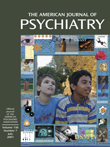Dr. Ho and Colleagues Reply
To the Editor: While our interpretation may have been “at odds” with the literature on the duration of initial untreated psychosis, our findings were in keeping with those of more recent studies (1–3). We feel our conclusions were based on a fair analysis of our data. Twenty-three of the 28 Spearman correlation coefficients we examined (14 outcome measures times two measures for duration of untreated psychosis) were less than 0.20. The remaining five correlation coefficients were no more than 0.27. Although the term “moderate” is arbitrary, we cannot agree with Dr. McGorry et al. that these were “moderate correlations.” In addition, at such magnitudes of correlation, the concerns regarding low statistical power from a group size of 74 and Bonferroni correction become less consequential. We had initially opted not to correct for multiple comparisons in our original manuscript, but we subsequently acceded to requests from reviewers.
Dr. McGorry et al. raise the question of which diagnostic categories are appropriate for studies of the duration of untreated psychosis. They suggest that a “second attenuating factor” for our lack of significant correlations was the purported exclusion of patients with schizophreniform disorder. One might argue that if the goal is to examine the effects of untreated initial psychosis, it may be appropriate to include any patient with first-episode psychosis, irrespective of diagnosis. However, using such a heterogeneous group may be methodologically less rigorous, since diagnosis can be a confounder. Patients with affective psychoses tend to have a shorter duration of untreated psychosis and better outcomes than patients with schizophrenia. Hence, the magnitudes of the correlations between duration of untreated psychosis and outcome can be erroneously inflated when such a heterogeneous group of patients with first-episode psychosis is studied. All 74 subjects in our study had a diagnosis of schizophrenia by the 6-month follow-up.
However, 23 (31%) did not have schizophrenia at the time of intake into our longitudinal study: 15 had an intake diagnosis of schizophreniform disorder, two had schizotypal personality disorder, two had substance-induced psychotic disorder, one had major depressive disorder with psychotic features, and three had psychotic disorder not otherwise specified. This important information had been in the original manuscript but was inadvertently deleted in subsequent revisions. We apologize for having misled Dr. McGorry et al. and other readers into thinking we had excluded patients with schizophreniform disorder. Our assertion that our findings “bode well for patients” referred to the weak associations between lengthy duration of untreated psychosis and poor outcome, not to the poor quality of life at 6 months per se.
Treatment-seeking behavior is a complex phenomenon for which duration of untreated psychosis is a simplistic quantification of the obstacles that hinder timely initial treatment for patients with schizophrenia. We definitely support efforts to better understand these obstacles and to bring patients to treatment sooner. Our findings must not be misconstrued as attempts to undermine the prevention of schizophrenia. We feel the interest of patients will be best served if preventive research proceeds cautiously and remains data driven as it negotiates the ethical minefield. Finally, we greatly appreciate the leading role taken by Dr. McGorry and colleagues in championing the cause of prevention in psychiatry.
1. Craig TJ, Bromet EJ, Fennig S, Tanenberg-Karant M, Lavelle J, Galambos N: Is there an association between duration of untreated psychosis and 24-month clinical outcome in a first-admission series? Am J Psychiatry 2000; 157:60-66Link, Google Scholar
2. Hoff AL, Sakuma M, Razi K, Heydebrand G, Csernansky JG, DeLisi LE: Lack of association between duration of untreated illness and severity of cognitive and structural brain deficits at the first episode of schizophrenia. Am J Psychiatry 2000; 157:1824-1828Google Scholar
3. Fannon D, Chitnis X, Doku V, Tennakoon L, O’Ceallaigh S, Soni W, Sumich A, Lowe J, Santamaria M, Sharma T: Features of structural brain abnormality detected in first-episode psychosis. Am J Psychiatry 2000; 157:1829-1834Google Scholar



